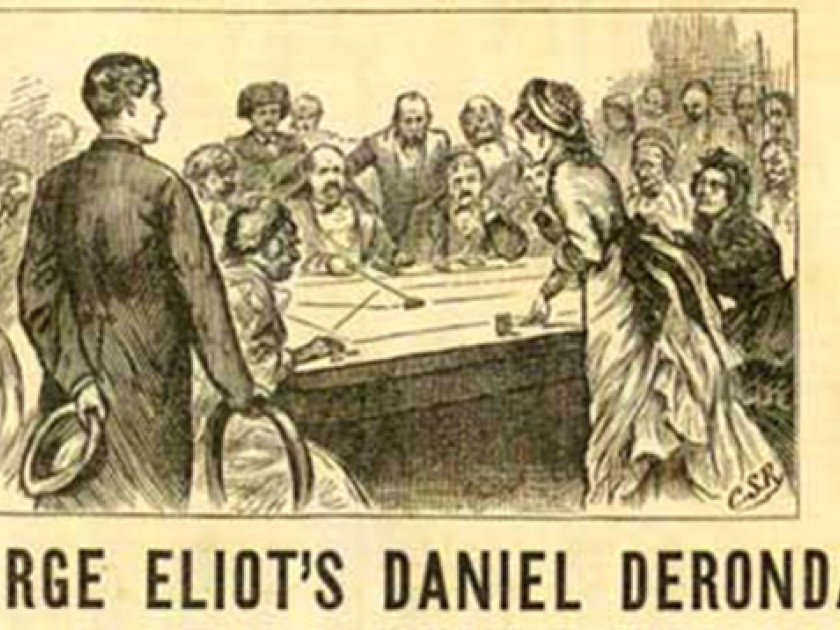Join a community of readers who are committed to Jewish stories
Sign up for JBC’s Nu Reads, a curated selection of Jewish books delivered straight to your door!

Devorah Baum is the author of Feeling Jewish (a Book for Just About Anyone), out this week from Yale University Press. She will be blogging here all week for Jewish Book Council’s Visiting Scribe series.
Daniel Deronda – You’ve heard of the “magical Negro”, well here is George Eliot’s magical Jew (positive). A philo-Semite’s vision of the Jew as manifesting radiant spirituality, wisdom, morality, Zionist longing and soulfulness. F. R. Leavis thought the novel would be excellent if only the “bad half,” i.e. the sentimental bit featuring Deronda himself, could be removed.
Svengali – the magical Jew (negative) – And then there’s the anti-Semite’s vision (George du Maurier’s) of the wicked, mysterious arch-manipulator: the immigrant foreigner who spoils the purity of the good people of England, and not least the innocent young girl he seduces.
Cohen of Trinity – The late nineteenth century Anglo-Jewish character in Amy Levy’s short story by the same name is everything you’d expect from one of the only Jewish students in a Cambridge college: hysterical, fascinating, grotesque, bewildering, self-conscious and self-hating.
Tevye the Milkman – The loveable, super kvetchy Jewish patriarch and shtetl dweller on very intimate if not combative terms with God: “You help complete strangers – why not me?”
Joseph K. – Kafka doesn’t explicitly say he’s Jewish, but we can’t but suspect that he is (just as we don’t doubt that that strange insect in the Metamorphoses must be, surely). Joseph K. is the existential Jew, forever on trial for he knows not what.
Shimon Susskind — Bernard Malamud’s refugee character in his short story “The Last Mohican” is another wandering Jew who first appears to the American Jew who has come to Europe as a wide-eyed tourist as a less than pleasing hanger-on: a schlemiel, a schnorrer, a hustler, and a social embarrassment. Yet these same qualities are ultimately transformed into the means by which Susskind, by the end of the story, is established as a moral guide, a history lesson, and a religious revelation.
Micòl Finzi-Contini – The beautiful young daughter of the Finzi-Contini family with whom the narrator falls helplessly in love in Girorgio Bassani’s magisterial representation of that other stereotype, the rich Jew. The Finzi-Contini family live behind high walls in a mansion opening on to a garden of earthly delights. But though they separate themselves as much as possible from the rest of the Jewish community and the world at large, their riches and high walls ultimately fail to save them from the gathering fascist storm that will remove them all to a concentration camp in Germany.
Rosa – Cynthia Ozick’s fictions have dared to imagine the interior life of more than one Holocaust survivor. In her short story, “The Shawl,” it’s the figure of Rosa, who becomes a “walking cradle” for her baby before the child is seized by a concentration camp guard and hurled to her death against an electric fence, who continuously haunts me.
Herzog – Like James Joyce’s earlier incarnation of the wandering Jew, Leopold Bloom, we have rich access to the stream of consciousness of Saul Bellow’s much more cerebral but no less profane Herzog, whose physical wandering is propelled by his wildly wandering mind. Herzog is a mad genius in the throes of a breakdown that casts, as Bellow’s fictions invariably cast, a critical but revealing light on the society in which he wanders.
Sophie and Alexander Portnoy – In Philip Roth’s book length comedy of the Oedipus-Schmedipus relation, it’s impossible to separate the castrating Jewish mother from the long-suffering Jewish son who acts out and blames his mother. Irving Howe once suggested that it’s because immigrant families are forced, in the context of an alien and hostile world, to fall back on themselves, that they tend to exhibit more symptoms of Oedipal angst than most.
Jacob Bloch – Moving from the far right to the liberal left, the protagonist of Jonathan Safran Foer’s novel, Here I Am, is a contemporary American Jew unsure of his purpose or place — in history, in geography, in politics, in religion, in his work life, in his family life, in his romantic life, in his own life. Like Abraham and Joseph K., he feels life is a trial, and perhaps too he feels he’s obscurely guilty of a crime he hasn’t altogether committed. He knows that he’s had the great fortune to have been positioned in one of the better, as in easier, chapters of Jewish history, and with that in mind he’s sought to be always on the right side of history (as in the left side of history), but he’s no less crushed and in crisis, and he senses that his Jewishness (and his historical comfortability) might have something to do with it. Since it’s not clear, however, what part Jewishness plays, or needs to play, or what may be done about it, all he can do is pour his heart and mind and fantasies and fears and lusts and guts out, thus ironically resuming the position of the biblical patriarch Abraham whose responsive word to the call of God – “Hineni” – we can interpret in this modern American novel as an assertion not of identity but of its annihilation: since I do not know who I am, all I can say is here I am.
Devorah Baum is a lecturer in English Literature at the University of Southampton, UK, and affiliate of the Parkes Institute for the Study of Jewish/Non-Jewish Relations. She is the co-director of the documentary feature film The New Man (2016) and the author of Feeling Jewish (a Book for Just About Anyone), published by Yale University Press.